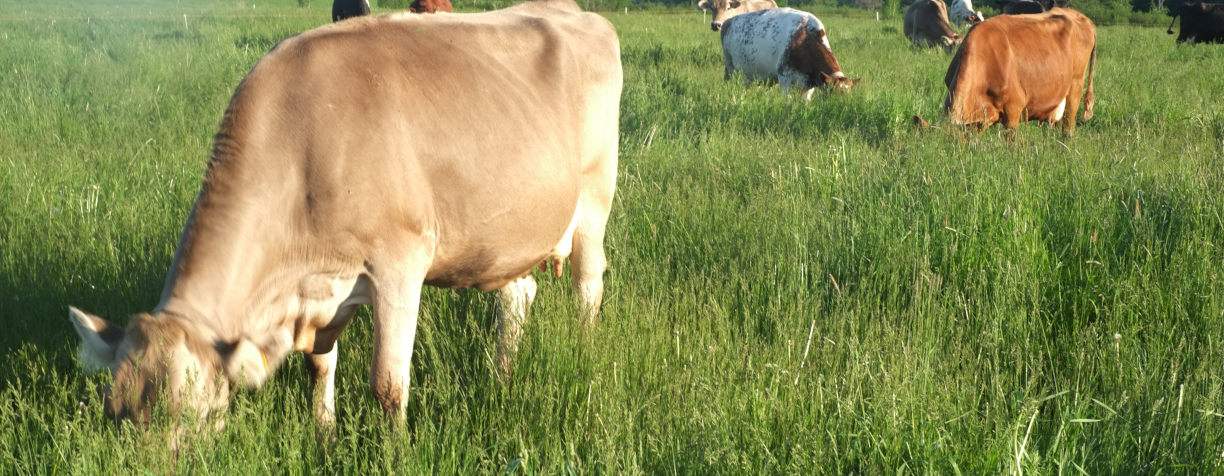By Deborah Jeanne Sergeant
Country Folks
SENECA FALLS, NY — Want to learn or teach the art of dairying? Consider an apprenticeship program. A. Fay Benson, dairy support program educator for Cornell Cooperative Extension Cortland County, presented information on Dairy Grazing Apprenticeship at Empire Farm Days. Newly begun in New York, the program seeks to teach anyone interested in dairying — but especially the next generation — about all aspects of pasture-based dairying. The program provides timely information. The local foods movement has drawn a growing number of new farmers to small-scale farming, niche agriculture and specialty products.
The apprenticeship program pairs experienced dairymen as masters with apprentices. The two commit to 4,000 hours of training for two years. The hands-on experience, class work, and accountability ensure that apprentices receive a complete education in dairying. The program covers 300 to 400 topics related to dairying and is recognized nationally as accredited coursework. In fact, Benson said that graduates improve their chances of securing funding for beginning their own farms.
Apprentices earn while they learn, receiving a minimum of $8 per hour (with a 6.25% increase every six months) and/or partial compensation in animals that can help establish their herd or housing.
“It can be very beneficial to live on or near the farm,” Benson said. “As we all know, farming doesn’t keep regular hours.”
Although many people shift careers these days or take on post-retirement careers, the apprenticeship program targets young people who want to dairy full-time for decades, not those who wish to dabble in dairying.
“By taking them on as an apprentice, it helps both of them in a long-term relationship,” Benson said.
The program began in Wisconsin, under the direction of Joe Tomandl, III, an educator who started his own dairy. Tomandl realized that passing along knowledge about smaller scale, grazing-based dairying is vital to the succession of the traditional dairy farm. The program’s goal is to provide a pathway to successful farm ownership.
The apprenticeship includes instruction from the Wisconsin School for Beginning Dairy and Livestock Farmers through distance learning locations; classes in grazing and dairy management offered online; pasture walks, field days, and workshops on grazing; GrassWorks Grazing Conference; and other workshops.
Anu Rangarajan, director of Cornell’s Small Farms Program, met Tomandl at a farming conference and liked the idea. She suggested that Benson look into it. At present, Cornell uses funding from its regional teams to promote the program until the school can obtain more funding.
“The little I’ve been able to do with it, I’ve been getting tremendous results and some nice opportunities,” Benson said.
Apprentice applicants must have a high school diploma or GED minimum, or a composite score on the ACT of at least 18, or comparable. They must be at least 18 years old, able to physically work on the farm with reasonable accommodations and have access to reliable transportation to the farm and school.
The farm itself must also pass muster and demonstrate that it operates safely, follows good agricultural practices, provides good animal care and that the farmer will dedicate himself to teaching his apprentice — or apprentices. Benson said most farms have one apprentice, but he’s known one teaching farm that had up to six.
If a farm or apprentice experiences any difficulties, Benson can assist them. He also follows up with apprentices to ensure they are receiving the education they need.
So far, only one farm in New York is exploring the possibility of offering the apprenticeship program.
“We’re hoping to get four official masters in New York,” Benson said.
Upon completing the coursework and the two years of mentoring, participants receive a journeyman certificate, which Benson said is recognized as college-level credit by the New York Department of Labor.
Benson took a one-week training course in Wisconsin about the Dairy Grazing Apprenticeship and learned that in Switzerland and Germany, only 15 to 20 percent of students pursue secondary education; the rest complete apprenticeships.
“I’m 62 and I’m at the age where I know how important it is to pass on this knowledge to the next generation,” Benson said.
For more information, contact DGA Executive Director Joe Tomandl, III at 715-560-0389 or A. Fay Benson at 607-391-2660.


